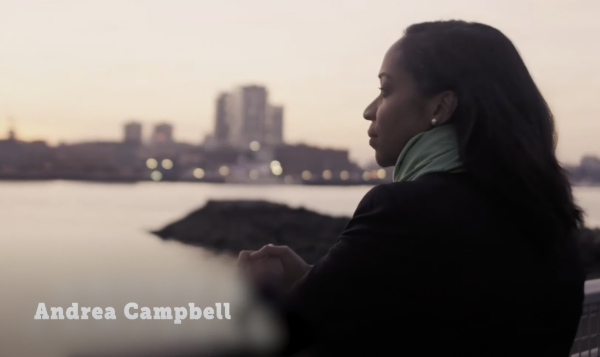August 26, 2021

A screenshot from one of the pro-Campbell ads put together by the "Better Boston" super PAC.
A super PAC supporting Andrea Campbell’s mayoral campaign believes 68 percent of likely voters remain “up for grabs” ahead of the Sept. 14 preliminary, according to an internal memo written by a 2013 candidate for mayor.
The super PAC has another TV ad in the works, said the memo, which was obtained by the Reporter. Two ads are already up on TV.
Super PACs, as they did in 2013, are playing a big role in the 2021 mayoral race, spending hundreds of thousands of dollars on airtime and canvassing efforts. While they can spend unlimited amounts of money, they cannot coordinate with the mayoral campaigns.
John Connolly, the former at-large city councillor who lost the 2013 mayoral race to Dorchester state Rep. Marty Walsh, wrote the memo for “Better Boston,” the super PAC that has raised nearly $1.5 million and spent almost $940,000 in support of Campbell, the District 4 councillor and former deputy legal counsel to Gov. Deval Patrick.
In his note to Campbell supporters earlier this week, Connolly said he was asked by Sonia Alleyne, the chair of the super PAC “Better Boston,” to author an analysis of this year’s race as it stands. The memo doubled as a fundraising pitch.
Connolly highlighted an expected pre-preliminary poll from the Boston Globe, as well as an endorsement from the daily newspaper as among the things to watch as the preliminary draws closer. A Sept. 8 TV debate and a Sept. 9 broadcast debate will also play a role, he wrote.
Connolly sent out his memo before the Emerson College/7News poll came out Thursday night. The poll of likely voters showed Councillor Michelle Wu with 24%, Councillor Annissa Essaibi George at 18%, Acting Mayor Kim Janey at 16%, Campbell at 14%, and former city economic development official John Barros at 2%. South End state Rep. Jon Santiago, who dropped out but whose name will still be on the Sept. 14 ballot, was at 1%. The undecided vote stood at 25%. The poll had a margin of error of 3.9%.
“Every public poll to date has shown a large undecided vote and even larger numbers of ‘Soft Voters,’” Connolly wrote in the memo. “Soft Voters have picked a candidate, but say that they might change their mind before Election Day.”
He continued: “Our internal polling shows that not only are 20% of likely voters undecided, but also that 48% of likely voters are soft supporters for their candidate of choice.”
The numbers add up to “plausible paths” to the November final for the four women of color in the race, according to Connolly, who argued that the super PACs, paid advertising, the Globe poll and endorsement, and the debates will all play a role in voters' choices.
Each of the major candidates has at least one super PAC. Janey and Wu have two. One of the pro-Janey super PACs is tied to the hospitality workers union UNITE HERE Local 26, while one of the pro-Wu super PACs, led by a former aide to Sen. Elizabeth Warren, launched a TV ad this week.
Earlier this week, Essaibi George’s mayoral campaign released a memo to Politico Massachusetts, touting an internal poll that showed Wu with 27% and Essaibi George tied with Janey with 15%. Campbell was at 10% and Barros was at 5%. Citing a “slight sampling discrepancy" in their own poll, the Essaibi George campaign said it believed their candidate’s numbers were “actually higher in reality.”
Earlier polls this year have largely shown Wu and Janey in the lead.
In addition to a new TV ad, the pro-Campbell super PAC is also planning digital ads that target voters searching the internet about the preliminary, according to the memo.
The money raised and spent already has made a “big difference,” Connolly wrote in his memo. “Our research shows that voters who saw our ads were three times more likely to support Andrea Campbell."
Critics of the “Better Boston” super PAC say its donors are aligned with charter school supporters, though the outside group has also garnered donations from attorneys, educators and the manager of a Caribbean restaurant in Codman Square, according to publicly available campaign finance filings.
A spokesperson for the super PAC, which first formed in March, did not immediately respond to a request for comment Thursday evening.
Topics:


